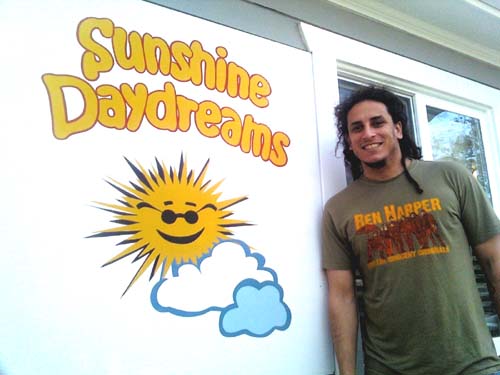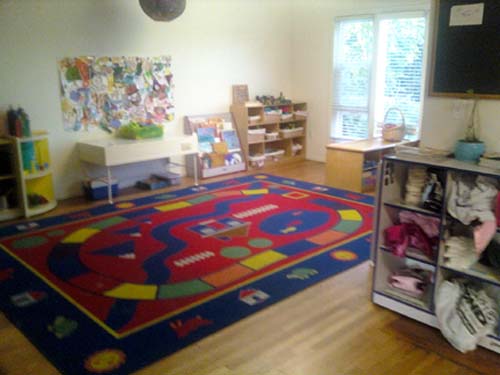David Frank started his own business at 23. But unlike many young entrepreneurs, he didn't start a restaurant, a fashion line, or a music label. The dreadlocked surfer founded Sunshine Daydreams Childhood Development Center instead.
With his mother's help, he completely re-configured the inside of a Culver City home so it could accommodate -- as it does today -- four teachers, two administrators, and 26 children. Things began slowly. Just one student attended the first day. But within six months, the place was full. And, today, there's a two-year-long waiting list.
Frank says he doesn't know of another male running an accredited preschool like his on the Westside. But he expects that could change as the early childhood development field continues to professionalize.
I visited the school recently and had a chance to chat with Frank, who grew up in the Pico-Robertson area. Surprisingly, he said it was his very first media interview ever.
AR: How'd you decide to start the school?
DF: I actually left school when I was sixteen and got my GED. When I was 17, I started teaching children to swim and slowly I moved into working at a summer camp. From the summer camp, I got recruited to work at a preschool. The director said she'd hire me if I enrolled in SMC. Once I did, at 19, I realized I liked it and I ended up getting my BA in child development in three-and-a-half years.
AR: Is there something about preschoolers that's particularly engaging for you?
DF: I really enjoy the innocence of the younger children. When I was going through my education, I had to make a decision: Would I go for my teaching credential and become part of the school district and play that game? Or did I want to focus on early childhood development and possibly in one year do this? And I chose to go the preschool route.
AR: I've looked at the before and after pictures. I've seen the extensive work you had to do to make this a place for kids. Why was this a better way to go than LAUSD?
DF: I had worked at New School West for several years, and I did have an entrepreneurial side to me. So I wanted to find a way that I could make more of a comfortable living and put my own spin on what we teach the kids. And what we do is focus on social and emotional growth. They learn all the academics, all the cognitive skills, but it's through a very play-based, child-centered environment.
AR: And when you say "play-based," what does that mean?
DF: It comes out of how we feel children are most open to learning. If a child's
comfortable in the sandbox, we teach them scientific things by their dumping and
filling the buckets of sand. We might teach counting by having them sort and place red
buckets together or by counting them. We might build their social skills by inviting their friends to create a moat or a castle or whatever the project may be. 
AR: Was this the first time you had been a manager when you took this on?
What was that like?
DF: At first it was a little intimidating and I think I'm still growing into being a director. I have a very relaxed approach and I think it works well for my students and staff now. I think sometimes I do need to be a little bit more of an authority figure. But I like to give freedom to my teachers and I don't like to micromanage.
AR: Do you encounter stereotypes, and how do you rebut them?
DF: Not so much now because my school has developed a good reputation. But when I first
started, yes -- especially because I have dreadlocks. Parents would be shocked. Now when Roleen Heimann, my mentor at New School West, refers me, she says something like "There's a young guy with dreadlocks, who has opened this school. He's very open and liberal." So people have an idea of what they're walking into.
AR: Was there ever a time when you said, "Maybe I should cut off these dreads?" Or have they become some kind of a symbol for you?
DF: I never thought about cutting off my dreads. When I first started, my dad offered me a thousand dollars to cut off my hair. I declined.
AR: You've got this thing going. What do you do next?
DF: I keep it going. But my school will go through a change in September 2012. We're going to end classes at two-thirty in the afternoon, instead of five-thirty like now. I may leave the country and see if I can get involved in child development in Central America or the South Pacific. We may train my sister to be the director. If I stay in the country, I'll use the late afternoon hours to consult for others opening centers.
AR: Do you see more younger people getting involved in child development?
DF: I do. The field has been trying to professionalize itself. So the teachers are being expected to have more college units before entering into a preschool classroom. Which I think is great because I think our field as a whole is being taken more seriously. Brain development between zero and five years is crucial. So I think that's really helping our cause.
AR: What's going on internationally that you feel you could make a contribution?
DF: Well, I would enjoy the travel, and the destinations I mentioned happen to have good surf. And I've never traveled for an extended period of time. But when I do travel I'm always aware of what are the children doing.